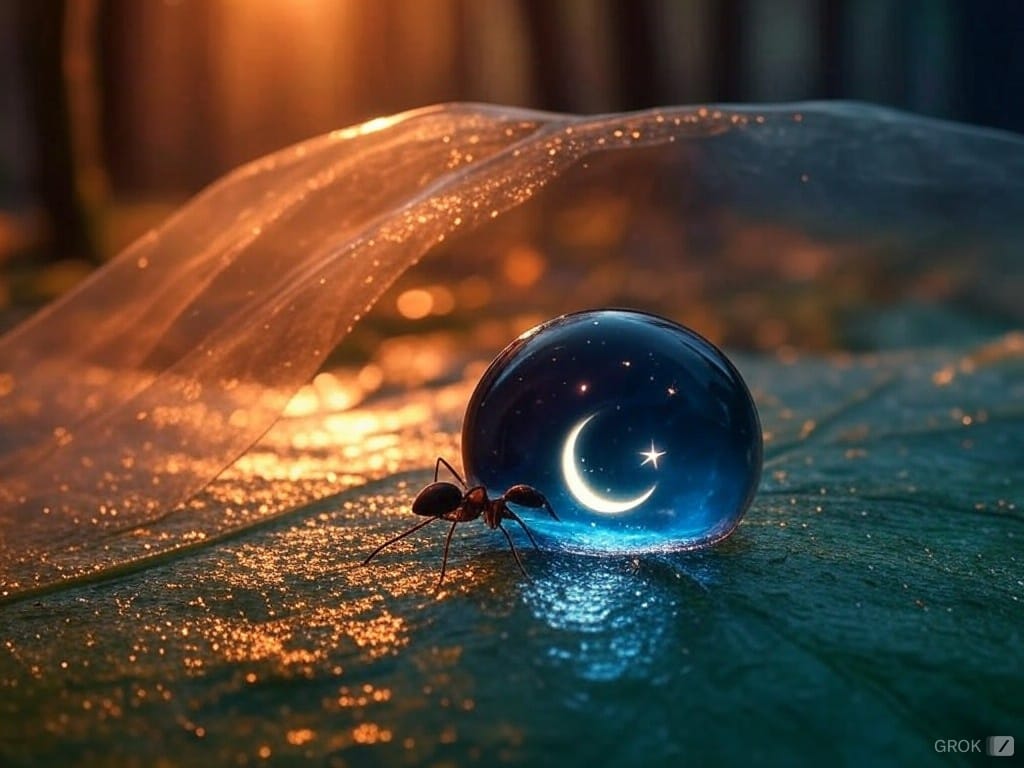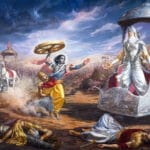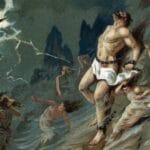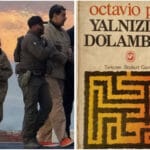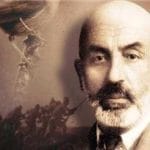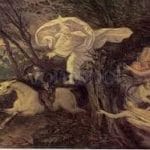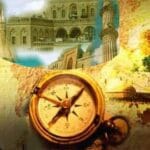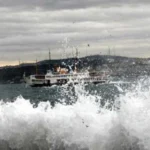“You can’t erase some things in one sweep; you erase them thrashing…”
(Özdemir Asaf)
“Fear destroys the heart,” says a Bosnian proverb. The fear of death is the mother of all fears. Everything has an end, and the inevitable fate of what is finite is to give birth to fear. The only remedy is faith in eternity — in God and in the Hereafter. The heart, as the symbol of this faith, of spirituality itself, conquers fear by linking mortal human beings to the eternal realm to which they belong. The serenity of the heart clashes with causes of fear such as death, hunger, failure, and defeat. If fear prevails, faith departs.
Perhaps that is why Western civilization — while mastering all the “gods” it learned from ancient Greece, that is, the various attributes and laws of the universe — has never been able to unravel Kronos, the “mystery of time.” Time — the continuity that has an end — is, in truth, death itself. No matter how much of a paradise on earth you build within the bounds of existence, time will undo it. And there is always a new beginning. Even the world did not remain to Sultan Suleiman, and now owls cry out in the palaces of Afrasiyab. Faith in God and the Hereafter teaches the peace of what is eternal — that is, how to bind the fleeting life of this world to it rightly, and how to live without becoming a slave to life itself. Those who do not truly believe can never grasp this. For that reason, the West will never find the treasure it seeks — the cure that overcomes the fear of death — because it does not know how to believe, and stubbornly wages war against those who do.
The meaning of life is grasped only when this fear is overcome. Like Uncle Halil.
Uncle Halil, from Aleppo, was living in a refugee camp in Hatay. He had lost his three children, his wife, and all his close relatives, and had fled to Turkey with his surviving young daughter. While tending to wounded Syrians day and night — and doing so cheerfully — a friend once asked him how, amid such a tragic story, he could remain so full of life, self-assured, and hopeful.
He replied:
“My child, this is how we used to live. One day the police station summoned my daughter. I went with her, just in case. My daughter was very beautiful, and she entered the commander’s office wearing a niqab to hide her face. The commander first lifted her veil with his hand. He hurled curses and obscene words. Then he called her into his office. When I objected, his men pounced on me and roughed me up. The commander shoved his shoe against my mouth and told me to lick it. Then he took my daughter into his office…”
Here, my friend said, Uncle Halil stopped telling the story. He swallowed hard, and then continued:
“My child, the revolution began, and we learned to rise up. We have now understood what it means to climb out of the pit of a life worse than death and live with our honor intact. In all my years I can’t even remember what I had been doing before. For the first time, I feel that I am truly alive. For the first time, I feel free. I do not grieve for those I have lost, for they too are now free, and I will soon join them. After all, we are all going to the same place — to God.”
As Hamas leader Ismail Haniyeh has said:
“O oppressors, you can kill us but you cannot defeat us, because we love the death you so fear — for we believe in God, who created both death and life. This is something you will never understand.”
Fear also destroys hope. And those without hope for the future have no future at all. This is why the oppressors of Syria, Iraq, and Israel — despite having the whole world at their backs — cannot subdue or conquer the defenseless, powerless, abandoned yet hope-filled oppressed communities. Yet while these noble and faithful peoples overcome fear, stand with honor, and pay the price with trust in God’s decree, elsewhere there are those who, without tasting any suffering or paying any price, tremble in fear. That, in truth, is the greater tragedy.
Perhaps the most dramatic consequence of our ill-fated last two centuries is this sense of fear — not rooted in our faith, yet seeping into the state and society. Since 1827, when the joint British–Russian–French front treacherously trapped and wiped out the Ottoman and Egyptian fleets at Navarino in a single night, this fear has lodged itself in the state, reigning like a demonic whisper over almost everyone and every faction for centuries. Perhaps its roots go back even further — to the fall of al-Andalus, to the Crusader and Mongol invasions. Since the Tanzimat era, we have been ceaselessly producing and sharing a thousand kinds of fear: religion is in danger, the state or regime is collapsing, we are being divided, reactionism is on the rise, women will be veiled by force, your daughters will become immoral… We writhe in a constant state of anxiety and hostility. Above all, because the state itself was founded upon these fears, it has poisoned everyone as a father figure that manufactures enmity and grows tyrannical in the name of self-preservation. Yes, because we are Muslims, and because we live on these lands — a critical geopolitical crossroads — we have been in a state of war for a thousand years. Even when we have won at times, the history of our ummah has been filled with external assaults and civil wars. Time and again, we have come to the brink of annihilation, only to rise again through rebirths. And the state exists precisely to navigate this tumult on behalf of and in favor of society. Yet until now, what we have had instead is a state mentality that not only spins out every fear-laden nightmare scenario but also, by enmity toward its own people, serves as a proxy for the Crusaders.
Thus, as a symbol of ending this state mentality — one that has fed on fears and self-doubt for the past two centuries — Tayyip Erdoğan has shattered and fractured the order of fear, though it has not yet been fully destroyed. The borders, habits, devşirme population, complexes, and ideological perversions inherited from the last Crusade, the First World War, still remain. Crusader ideologies such as positivism, nationalism, socialism, and liberalism can still steal our youth and turn them into Western missionaries, hostile to their own parents and values. Our army is still far from the spirit of the Peygamber Ocağı — the Prophet’s hearth. The state still operates as the British and French once set it up.
Even as hope for the new rises within society, we are forced to endure living alongside the wretched mass that the old order has rotted and corrupted. For the first time, the native people of Anatolia — the true Turks and Kurds who have not been “infidelized” — have sent decision-making elites into the state. Yet the liquidation of the devşirme elements with hypocritical natures, of the organizations and sects, of the Turkish–Kurdish fascists who worship their primitive ethnicity and divide the Islamic nation, of the Kemalist-minded bureaucrats, and of the immoral, rentier oligarchy — the last weapons of the old order — has still not taken place.
In short, we stand at the crossroads where the dying “old Türkiye” meets the rebirth of a noble state that belongs to its people.
The dialectic of fear that has seeped into our very constitution, our spirit, and our reflexes also leaves its mark on daily politics. For those who see events as part of the shared destiny of the ummah, nothing that is happening is unfamiliar. For those who read the shared fate of the Mesopotamia–Mediterranean basin as the ancient struggle between the Abrahamic tradition and the pagan–idolatrous tradition, there is nothing new. This is a war, and our cause is nothing other than choosing the right side in this war and running to the campaign. We are accustomed to being judged and struck, in alliance with the enemy, in the name of each of the “gods” that those who worship power, wealth, position, and success alongside God set up as equals to Him. Like the idolaters of ancient Iran, Babylon, Egypt, Greece, and Mecca, they have many idols. They have idols of success — for instance, the failure to overthrow Assad in Syria is, for them, proof of that idol’s legitimacy. They have idols of power as well — the United States is so powerful, they say, with a gross national product of such-and-such, with new weapons that could, if it wished, destroy the world; China’s population, the Englishman’s satanic calculations, Russia’s natural gas, Iran’s intrigues… “We cannot contend with them,” they say. “The best course is to be cautious, not to upset the order, to proceed more slowly and with a softer tone.”
They think what is taking place is nothing more than a simple power game, a regime change, an attempt to strike a new balance with the West. Or else they imagine it is a set of moves planned, staged, and executed according to some hidden agenda… because that is the kind of theology they have. “The gods (the great powers) are fighting. The duty of the servants (the powerless nation-states) is to strive for their own god’s victory. Or else to live without touching the water or the soap. In this game, whoever loses is cast out. Therefore, it is enough for the state’s existence and survival to side with the winner and remain in the game.” Such a pagan subconscious has no capacity to comprehend the plain, simple, natural believer’s reflexes of the Halil Amcas of this world, or of the mothers who, after years of enduring every kind of oppression, injustice, poverty, and humiliation, strive to be worthy of the day they have awaited with patience. Our mothers — who know what the smug intellectuals confused by Western theories do not know, and who, with their pure faith, fear no outcome — understand that what is happening today in a Muslim society, within a Muslim history, is nothing more than the restoration through faith of the self-confidence we lost to fear, and a normalization in that direction. This is precisely what never convinces the faithless cowards of every shade from the old order — because in this truth there is no place for the gods they worship: American schemes, the Jewish lobby, Russia, Iran, money, weapons, oil, a strong economy, so-called geopolitical realities, sociological this-and-that… There is no false god in our mothers’ hearts. There is only “Him,” and whatever He decrees comes to pass. Everything unfolds through God’s will and the simple efforts of ordinary people grounded in trust and faith. And so nothing that is feared actually happens. On the contrary, the walls of fear crumble one by one with each passing day. The monsters that devour our children are smashed to pieces; the idols that divide society — races, sects, ideologies — are thrown into the trash; vast, intrigue-mongering cliques are laid waste; and a death-worshipping, idolatrous regime is step by step dismantled, making way for the possibility of building from within it a more normal order founded on freedom and nobility.
Lacking that ancient faith — the notion of tawhid that makes a human truly human; that brought Turks, Kurds, Arabs, Bosniaks, Georgians, and Albanians onto the stage of history; that we owe for safeguarding the security and dignity of our entire region against the oppressors of both East and West — the old state bureaucracy, bereft of honor and character, unable to think universally, and devoid of the nobility of a believer, now looks upon this new process and its cadres with anxiety and envy. Rather than trying to understand, rather than transforming themselves and casting off their fears to be free, the servants of the old regime continue to scheme over how to perpetuate their hostility, how to stoke the cauldron of discord with resentment and spite. These elements, disturbed by anything normal, will deepen their immoral alliances with Western and Eastern “triads” who see in Islam, in Türkiye, and in this nation their unfinished business — and such alliances will only breed more strife. Yet the essence of life is simple: God has created the simplest solutions for the most difficult problems. All the devil’s tricks are undone by a simple prayer — just as, in recent years, the countless tricks and conspiracies against the process of self-renewal in our country and our region have, each time, shattered into dust against the invisible walls woven by our mothers’ pure and sincere prayers.
God preserves humanity — the very essence of the human being — through mothers and children. It is for their sake that we live, and they are the guarantee of our existence and survival. Because they remain distant from money, power, position, and illegitimate dealings — the things that corrupt us adults — those pure, divine hearts beat only within them. For this reason, more than empty words, it is enough to look into the eyes of mothers and children, to learn, to stay on the path, and not to lose truth and direction. Not only in Anatolia, but all over the world, there are mothers who pray for Türkiye and Erdoğan, whom they see as the symbol of changing their centuries-old ill-fate. Despite the downpour of false news and tools of reverse propaganda, without expecting any benefit, without any support from advertising, cinema, television series, or the like, without any prompting or outside pressure, entirely voluntarily, driven purely from within, these mothers say, “May God protect him and break the hands of his enemies.” And just as in every corner of Anatolia, so in Jerusalem, Damascus, Cairo, Baghdad, Kurdistan, Afghanistan, Tunisia, Mauritania, Bosnia, Skopje, Batumi, even in Yerevan, Athens, Sofia, Belgrade, Granada, Paris, Berlin, London, New York, Latin America, and Asia, there are mothers, young people, and children who keep alive this purity, compassion, and hope. They are people whose eyes shine, whose faces are immaculate, whose beings are radiant. None of them yet know what fear is. Blood, tears, oppression, massacre do not frighten them. They have never tasted pain, never known torture; they have never been beaten by a teacher for speaking their mother tongue, never been barred from school for wearing the headscarf, never been humiliated for praying, never been imprisoned for thinking differently, never known what it means to suffer oppression from their own state in their own country for defending the rights of the oppressed and poor, for desiring a freer, more independent nation, or for defending their homeland and people. In the end, they have no knowledge of people who, for the sake of a cause for humanity, have languished in prison for decades over trivial pretexts. They have not yet met the hundreds of thousands whose youth has been stolen. Each one, like a Moses, is still unacquainted with the cruel world their elders have witnessed — and so they are pure, and they are brave. They do not know the false history, the false information, the empty memorized dogmas their elders have been made to recite; they are unfamiliar with so-called science, ideologies, modern idols; they have not yet inherited the races, nationalisms, and sects over which their elders have shed blood. These are the people — women, youth, and children — who bear the spirit of God’s immutable law of change, the law that proves the transience of this worldly life and destroys the palaces of the Khosrows. And as these children grow, the mechanisms of the twentieth century will crumble, many oppressive orders thought unshakable will be overturned, and once again the breath of the devils will be spent.
Thus, in defiance of the faithless whose hearts have withered from fear, it is this pure courage of the children and the prayers their mothers offer with divine inspiration that alone should be the guide of the new state. For the only untainted essence of humanity lives in these hearts. For the meaning of our cause — the exaltation of God’s word (ilâ-yı kelimetullah) — becomes clear in the light of these pure and unsullied souls. For only this cause can make a human being a noble human being. And each of those idols made of sweetmeat, fashioned and worshipped by man — state, nation, homeland, flag, race, religion, sect, ideology, law, democracy, freedom, economy, interest, money, office, rank, love, passion — can have value only insofar as it is a means to this cause, and when it harms the cause it must be discarded like a false plaything of the world. In defiance of a tyrannical world that makes human beings servants to other human beings or to other created things, in service of our cause — which enables us to be honorable and dignified human beings — the state, the homeland, and offices are worth no more than a Qitmîr. Whoever worships these things should know that not one of those idols will ever again be worshipped. Whoever wishes to live with honor, labor, and faith should know that the new saplings that have sprung from these ancient lands — the brave children of those venerable mothers — are continuing the campaign from where they left off.
Now all the defeated, the oppressed, the helpless are looking to Türkiye.
The beloved sultan of the East, Saladin; the noble warrior of Anatolia, Kılıç Arslan; the last sultan of al-Andalus, Abu Abdullah; the greats of our shared history who were the knowledge, intellect, and conscience of the ummah — Imam al-Ghazali, Ibn Rushd, Ahi Evran, Haji Bektash, Idris-i Bitlisi, Osman Bey, Çelebi Mehmed, Mehmed the Conqueror, Abdülhamid — are looking to this new process. The last great revolutionary cadres of the Ottomans, who resisted to their final drop of blood against the last Crusade, the First World War — Enver Pasha, Kuşçubaşı Eşref, Mehmet Akif Ersoy, Zenci Musa, Kurdish Hilmi Musallimî, the Iraqi Shi’i Uceymi Sadun, the Lebanese Druze Shakib Arslan, the Tunisian Ali Bash Hamba, the Algerian Emir Abdelkader, the Libyan Sheikh Senussi, the Azeri Hüseyin, the Goralı Mehmet, the Skopje-born Hasan, the Palestinian Izz ad-Din al-Qassam — and thousands more noble souls, believing hearts, and courageous arms are now looking to the new Türkiye.
First, to revive this diminished society whose honor and confidence have been broken, to restore the usurped state to the service of the people, to make fragmented individuals and communities brothers again… Then, to close the two-hundred-year page filled with fear and nightmares and, as a modest step, to lay the foundation for another world, another civilization not with much, but with plain, simple, yet determined and courageous steps, to break this ill fate and continue the half-finished historical campaign… Every wounded eye of those who are human and who have faith is turned to Türkiye, praying that this path of historical resurrection will not stumble, that hope will overcome fear.
Either this road will be carried one stage further, or this nation — those mothers and children — will find another road for themselves. But there is no turning back…
Now, here is to another stage in this blessed campaign; for our cause, for the hope of our noble love — greetings.
